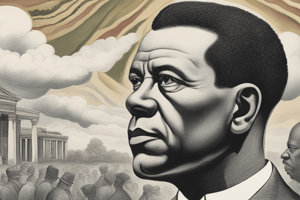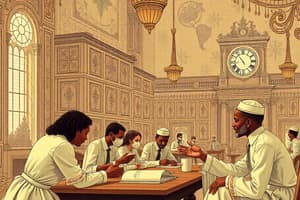Podcast
Questions and Answers
Who was Booker T. Washington?
Who was Booker T. Washington?
An African American leader who founded Tuskegee Institute and promoted economic self-sufficiency.
What does NAACP stand for?
What does NAACP stand for?
National Association for the Advancement of Colored People
What is yellow journalism?
What is yellow journalism?
Sensational newspaper coverage emphasizing crime and scandal.
What was the Supreme Court case Plessy v. Ferguson about?
What was the Supreme Court case Plessy v. Ferguson about?
What are Jim Crow laws?
What are Jim Crow laws?
What happened to the U.S.S. Maine in 1898?
What happened to the U.S.S. Maine in 1898?
What is the Roosevelt Corollary?
What is the Roosevelt Corollary?
What was the primary purpose of the Panama Canal?
What was the primary purpose of the Panama Canal?
What was Dollar Diplomacy?
What was Dollar Diplomacy?
What is socialism?
What is socialism?
Study Notes
Booker T. Washington
- Prominent African American leader from the late 1800s until 1915.
- Founded the Tuskegee Institute in Alabama, emphasizing vocational education.
- Advocated for economic self-sufficiency before demanding equal rights for African Americans.
NAACP
- Established in 1910 to promote the rights of African Americans.
- Aimed to combat racial discrimination and secure civil rights.
- Co-founded by W.E.B. DuBois, a key figure in the civil rights movement.
Yellow Journalism
- Describes a sensationalist approach to newspaper reporting.
- Focused on exaggerated stories of crime and scandal to attract readers.
- Played a significant role in shaping public opinion and increasing newspaper sales.
Plessy v. Ferguson
- Landmark court case that upheld racial segregation in public facilities.
- Established the "separate but equal" doctrine, legitimizing discriminatory laws.
- Set a precedent for institutionalized segregation in the U.S. for decades.
Jim Crow
- Refers to a set of laws enforcing racial segregation in the Southern United States.
- Emerged in the 1890s, mandating separation of public services based on race.
- Institutionalized systemic discrimination against African Americans.
U.S.S. Maine
- Warship that exploded in a Cuban harbor in 1898, leading to increased tensions with Spain.
- Media blamed Spain for the incident, influencing public sentiment and policy.
- Became a catalyst for the Spanish-American War.
Roosevelt Corollary
- 1904 addition to the Monroe Doctrine asserting U.S. intervention rights in Latin America.
- Intended to maintain stability and prevent European intervention in the Western Hemisphere.
- Reflected the U.S. foreign policy approach during Teddy Roosevelt's presidency.
Panama Canal
- Major engineering project that created a shortcut between the Pacific and Atlantic Oceans.
- Completed in the early 20th century, significantly improving maritime trade routes.
- Demonstrated U.S. technological and administrative capabilities.
Dollar Diplomacy
- Policy introduced by President Taft, focusing on economic influence in international relations.
- Encouraged American investments in foreign markets, particularly in Latin America and East Asia.
- Aimed at promoting U.S. interests without military intervention.
Socialism
- Economic and political philosophy advocating for public ownership/control of essential resources.
- Views government involvement as necessary to provide basic human necessities.
- Challenges capitalist models by emphasizing collective ownership and distribution of wealth.
Studying That Suits You
Use AI to generate personalized quizzes and flashcards to suit your learning preferences.
Description
Test your knowledge of key figures and organizations in US history with these flashcards. Learn about influential leaders like Booker T. Washington and significant organizations such as the NAACP. Perfect for students seeking to understand the impact of African American leaders and their contributions.




